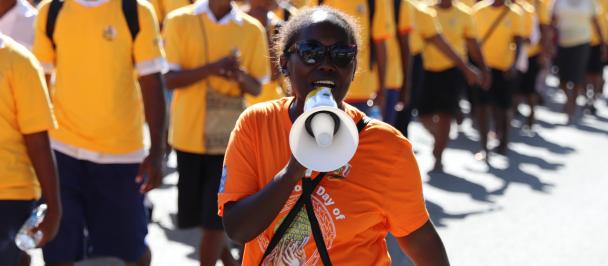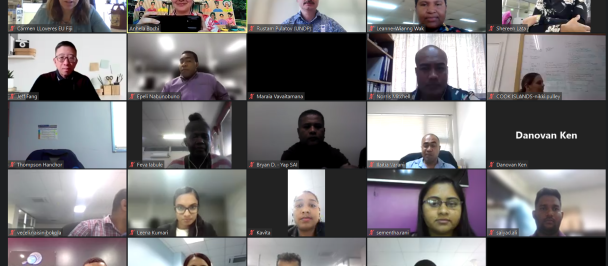Fiji’s State of Readiness to be discussed at major event in Nadi
April 17, 2023

Attendees at the State of Readiness training in Nadi.
Nadi, Fiji - A training event focusing on traditional and non-traditional security threats commenced today at the Blackrock Camp in Nadi, aimed at enhancing the capacity of border management agency staff, first responders, and clinicians at Fiji’s Points of Entry.
Spearheaded by the Ministry of Home Affairs and Immigration, in collaboration with key border management stakeholders such as the Ministry of Health, Fiji Police Force, Fiji Airports and health and medical actors from the private sector, the program will enhance Fiji’s national level of preparedness and equip participants with the essential tools and knowledge to effectively respond to future emergency threats.
With 2.5 million square kilometres of airspace and a thriving cruise ship industry, there remains an urgent need to prioritise and improve the country’s level of emergency preparedness, response, mitigation and recovery protocols at points of entry across both air and sea.
This work is being undertaken in line with Fiji’s National Development Plan with support from the Government of Japan and the United Nations Development Programme (UNDP) Pacific Office in Fiji through the Integrated Border Management Project. The project aims to support relevant border agencies in Fiji, Palau and Vanuatu in reinforcing their capacities, capabilities and systems for effective and efficient movement of travellers and cargo, and to strengthen links for data and knowledge sharing, inter-agency and cross-regional cooperation.
Minister for Home Affairs and Immigration, Hon. Pio Tikoduadua, said the training forms an integral part of the country’s National Border Security Priority Upgrade (2023-2025).

Minister of Home Affairs and Immigration, Pio Tikoduadua (left) with Deputy Head of Mission - Japan Embassy in Fiji, Tanaka Kenichiro.
“Over the years, government have invested heavily in our emergency response capabilities, including the establishment of emergency response centres, the procurement of state-of-the-art equipment and the continuous training of our first responders. However, we also recognise that the nature of emergencies is constantly evolving, and we must remain vigilant and adaptable to stay ahead of any potential threats,” the Minister said.
Deputy Head of Mission for the Embassy of Japan to the Republic of Fiji, Mr. Tanaka Kenichiro, added that digitization would be a key feature of Japan’s support toward future pandemic preparedness.
“The Government of Japan is working with the Government of Fiji to ensure that it is better prepared for any future emergency through supporting the digitization of systems and processes. Through the collection of incoming passenger information alone via a digital means, border management agencies can better identify transnational organised crime, with a digitized system better able to aid in the mitigation of health risks such as COVID-19,” he said.

Participants learn communication skills in a series of mock exercises at the State of Readiness training event.

First responders and key border management staff are participating in a preparedness exercise in Nadi.
UNDP Pacific Office in Fiji Resident Representative a.i, Ms. Dawn Del Rio, added “The lessons learned from the beginning of the pandemic through to now have pointed to the importance of well-managed actions at the local, national, and cross-border levels. They also highlighted the need for multilateral coordination and collaboration as we look to the future – particularly here in the Pacific – with the need to better cooperate on early warning and risk assessment.”
This initial three-day training will be followed by a further three-day event at the beginning of May, and a final three-day training from 17-20 May.
For further media enquiries please contact:
Nick Turner, Communications and Advocacy Specialist, UNDP Pacific Office in Fiji. (P) +679 971 6458 - (E) nicholas.turner@undp.org

 Locations
Locations


